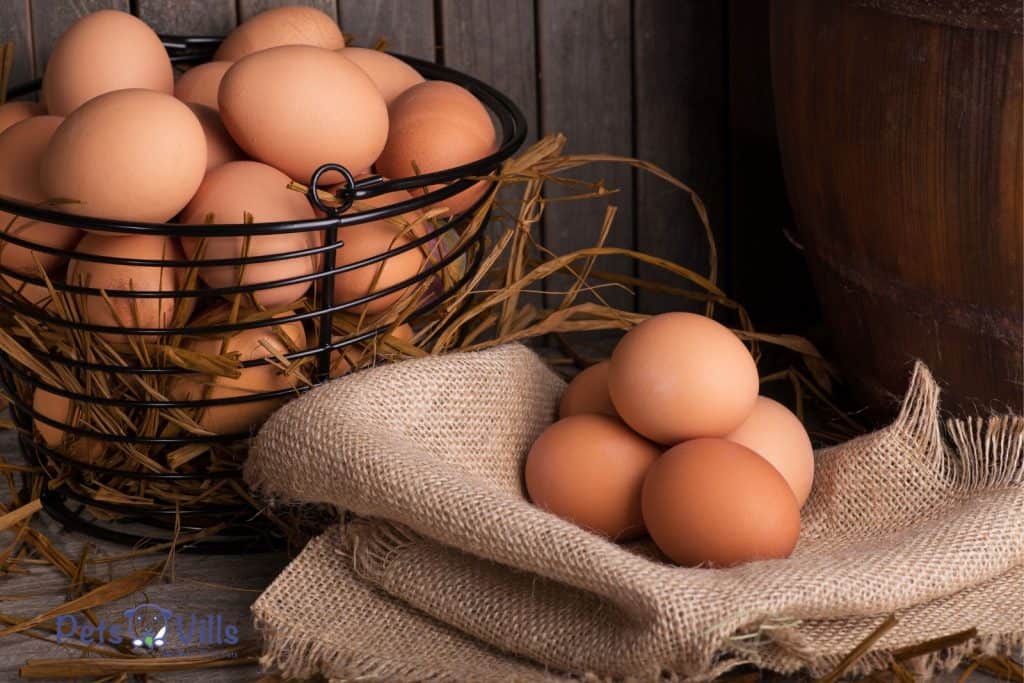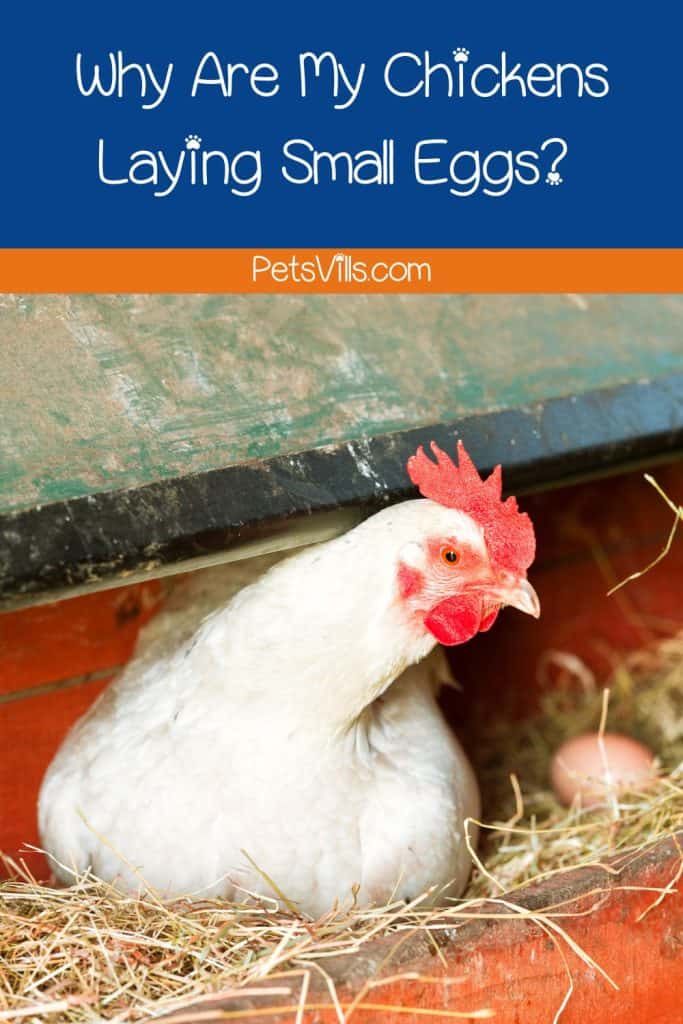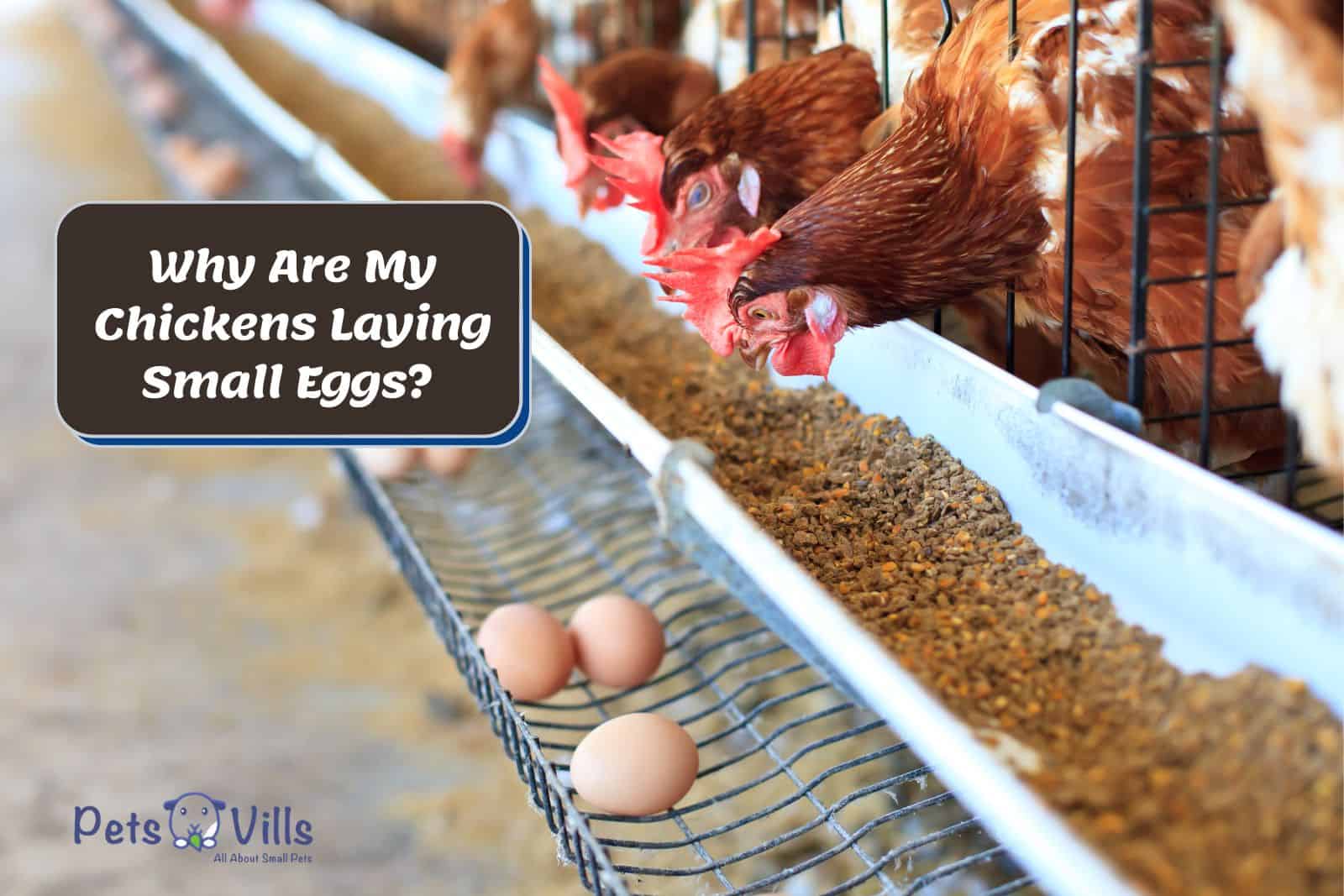If you’ve ever wondered, “So why are my chickens laying small eggs?”, let out a sigh of relief (I’ve got you covered!):
At a young age, chickens tend to lay small eggs, also known as fairy eggs (don’t sweat it)!
But, if your older chickens lay small eggs, these 5 reasons may explain why: age, genetics, nutrition, illness, and stress.
If you’re already hooked and want to know all you can about eggs and chicken, don’t stop ― keep reading…
Table of Contents
Key Takeaways:
- Your chickens lay small eggs for various reasons, usually because they’re young.
- Your supermarket’s average carton of eggs weighs 12 ounces. If your box weighs 18 ounces, you most likely got a box with smaller eggs.
- Proper nutrition stimulates egg growth ― so check the chicken feeds and ensure that your chickens get adequate nutrients from their main feeds.
Factors Affecting Egg Sizes
So, “why are my chickens laying small eggs?” is a common question among chicken owners, but it doesn’t have to be. First, I’ll get into what a small egg is:
As a standard, you’ll find your supermarket’s average carton with a dozen normal-sized eggs weighing around 21 ounces [1].
Likewise, cartons with smaller eggs weigh around 18 ounces, 3 ounces less than their medium-sized 21-ounce counterparts.

For your convenience, I’ve listed factors that will impact the size of your chickens’ eggs:
1. Age
At the start of laying eggs, the hen usually lays smaller eggs. As they start to get older, they will have larger eggs.
At around 23 weeks old, your chickens will lay their eggs. But it could be much sooner or later, depending on their breed, health, and seasons.
Breeds like the Leghorns, Golden Comets, and Asutralorps could start laying as earlier as 16 weeks.
Chickens will usually lay around 250 eggs per year. Each clutch will have an average of 12 eggs. Sometimes, the hen may lay a clutch of eggs smaller than usual.
Should you worry? Surprisingly not! But, if the hen lays a consistent clutch of smaller eggs, there may be an issue with the hen ― not the eggs.
2. Breeds and Genetics
Sometimes, chickens lay small eggs due to their breed and genetics. Sadly, you can’t control this area much.
But if you want large to jumbo-sized eggs, choose the suitable breeds of chickens.
Some of the breeds of chickens that are known to lay large-sized eggs include:
- Leghorns
- Lohmann Browns
- Minorcas
- Barnevelders
- Golden Comets
Then some breeds of chickens are smaller and will lay small eggs:
- Silkie
- Sebright
- Belgian d’Anvers
- Belgian Bearded d’Uccle
One breed of chickens, known as Bantam chickens, is the smallest. In most cases, a bantam chicken will be about half to a third of the size of its larger counterpart.
The result? These bantams will have smaller eggs than regular chickens.
A true bantam breed will not have any other large counterpart. These are the “true” bantams. These breeds are breeds within themselves, which means they are TINY.
Some of the most common breeds of bantam chickens are:
- Belgian Bantams
- Booted Bantams
- Brahma Bantam
- Cochin Bantams
- Pekin Bantams
- Sultan Bantams
- Japanese Bantams
- Dutch Bantams
- Buff Brahma Bantams
- Rosecomb Bantams
- Serama Bantams
3. Nutrition
Nutrition is crucial to the development of eggs, not only to determine how small or large the eggs will be but also their quality and taste.
If you feed your chickens properly, they’ll be healthy and happy.
To achieve this, focus on quality feeds, which should include at least 90% of their diet — the rest, the other 10%, can be fruits, vegetables, and insects.
Their primary food will be commercial feeds.
But for egg-laying chickens, I recommend a particular type, the Purina Layer Pellets, which you can buy from Amazon.
Features:
- Purina
- Provides complete nutrition for laying hens
- 16 protein
- Added vitamins and minerals
- No added antibiotics or hormones
Manufacturers created these commercial feeds with the right amount of vitamins, minerals, and other nutrients perfect for your hens.
Besides, hens must receive all the proper nutrition. If not, their eggs will be smaller than usual and quite bland.
4. Illness and Diseases
If your hens consistently produce smaller eggs, they could be sick.
Parasites such as worms, lice, or mites describe common reasons for illnesses. These parasites will stress them out ― the result is smaller eggs.
On the topic of vaccination:
Hens, especially those allowed to free roam, should be vaccinated often.
I recommend you vaccinate them every 2 months during the colder months and every month in the summer to ensure they’re healthy.
5. Stress
Chickens, like humans, are prone to stress from everyday activities. Stress has a significant impact on egg quality.
More so, chickens with a lot of stress lay smaller eggs than usual. Not only will the size be affected, but the taste and consistency will also be affected.
Here are 2 factors:
i. Space
Other times SPACE is a factor: Sometimes, letting the chicken roam freely is impossible due to your limited space. At a minimum, you should have an adequate-sized coop and run.
The coop should have all the necessities, such as roosting perches and nesting boxes with soft bedding.
ii. Hygiene
The cleanliness of the coop is also vital to prevent stress. Making sure to clean the coop every day of their coop is excellent and will keep them healthy and happy.
If you don’t have the time, you’re required to clean the coop twice weekly at a minimum ― no less!
6. Heat Stress
Chicken Vet Ben South, BSc (Hons), BVetMed, says: “It is vital that your birds don’t experience heat stress” [2].
Heat stress, another significant impact on an egg’s condition, usually happens because of a coop overheating.
Heat stress is linked to poor egg quality and affects the size of your chickens’ eggs.
To prevent this outcome, ensure that the coop is well-ventilated. If you want more, add a fan to ensure the coop is well-ventilated.
Another excellent defense against heat stress is proper nutrition. Among such minerals vital for excellent egg quality is calcium [3].
Broadly speaking, if your chickens receive adequate nutrition and enough calcium, they’re healthier and have a lesser chance of experiencing heat stress.
Luckily, you have a lot to do with it: monitor your chickens and ensure they get the correct portions of feeds and that they don’t snack on the wrong foods.
Now, if you’re the visual type ― or simply sick of reading ― I’ll give you a fantastic YouTube video by BIOMIN on this topic of heat stress:
How Do I Get My Chickens to Lay Bigger Eggs?
To get your chickens to lay bigger and healthier eggs, do the following:
1. Feed them quality layer feeds.
If you want bigger eggs, always provide them with quality layer feeds. Why’s that? Because these feeds pack meals with extra nutrition for hens.
Quality feeds like Purina Layer Pellets can be purchased from Amazon, a marketplace for quality feeds at a great price!
2. Increase calcium intake.
Calcium supplements are essential for stronger and bigger eggs. You can give the chickens crushed oyster shells and used eggshells.
These 2 are excellent sources of calcium.
3. Provide fresh water daily.
Hens need fresh water daily to help them lay bigger eggs. But be careful: contaminated water could contain parasites ― so check the water quality!
These parasites could cause the chickens to become ill, resulting in smaller eggs.
4. Provide a large open area.
Hens confined to smaller areas will usually lay smaller eggs due to stress.
When chickens are free to roam in a large open area, they are more likely to lay bigger eggs.
Prepare to be enlightened by my intriguing articles on “Do Chickens Drown in the Rain?” and “Can Chickens Eat Dragon Fruit?”—they’re an absolute feather-ruffling must-read!
Check out this video for some more tips:
FAQs
1. Are Tiny Eggs A Problem?
Not usually.
Though a couple of small eggs is not a worry, check with your local vet if this occurs frequently.
2. Can You Eat Tiny Eggs?
Absolutely!
Tiny eggs are perfect for eating, but because of their size, they don’t contain as much nutrition, and because they don’t have any yolk, they dry out faster.
Conclusion
So, now that you don’t have to ask, “why are my chickens laying small eggs?” let me tell you the nutshell version of it all:
Various factors affect the size of your backyard chicken’s eggs: the chicken’s breed, environment, and genetics all play a vital part.
Egg sizes, whether from the backyard or your local supermarket, may vary greatly:
A box of eggs in your local supermarket weighs around 21 ounces. Keep this metric in mind when you check for egg sizes and ― if in doubt ― consult your local vet.
A rule of thumb: Calcium deficiency will impact your chickens’ eggs negatively, decreasing the eggs’ size and providing lower-quality eggs. So watch out!
Now that you know the stumbling block, select feeds with proper calcium, ensuring that your chickens get good nutrition and that you can pick optimal egg quality.
Last but not least, if you’ve some sparkling suggestions, please don’t hesitate to leave me a comment. I’d love to hear from you!
Until next time…

Resources
1. AskUSDA [Internet]. ask.usda.gov. [cited 2022 Dec 29]. Available from: https://ask.usda.gov/s/article/How-is-the-weight-of-a-carton-of-eggs-determined#:~:text=While%20some%20eggs%20in%20the
2. South B. Excessive temperatures for long periods can be detrimental to a bird’s health [Internet]. www.chickenvet.co.uk. 2021 [cited 2022 Dec 29]. Available from: https://www.chickenvet.co.uk/news/post/excessive-temperatures-for-long-periods-can-be-detrimental-to-a-birds-health
3. An SH, Kim DW, An BK. Effects of Dietary Calcium Levels on Productive Performance, Eggshell Quality and Overall Calcium Status in Aged Laying Hens. Asian-Australasian Journal of Animal Sciences. 2016;29:1477–82.

My name is Ben Roberts, and I absolutely love animals. So, naturally, I love writing about them too! As far as my animals, I have a Pit-bull, a Beagle-lab mix, a Chihuahua, and one old cat. Each one of them provides me with a new adventure every day. And the best part is they’re all best friends. Well, except the cat when he gets a little annoyed.
FIND HIM ON: FACEBOOK and TWITTER.
Read his latest ARTICLES
Learn more about Benhere


